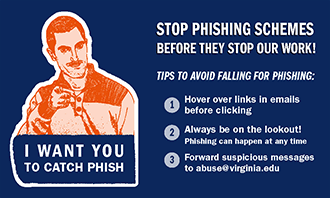IT Security Tips
Stop phishing schemes before they stop our work
Email is an essential way to communicate for both work and personal purposes. Many of us get dozens of emails a day.
Because emails are widespread, hackers take advantage of emails for malicious purposes. This type of attack is called phishing.
Phishing is a scam that uses email communication to trick you into giving up valuable information, like usernames and passwords, financial information or even personal details, like your social security number or answers to security questions. Attackers can get creative with their attacks in an attempt to make them look legitimate by impersonating someone you know, posing as a reputable organization or even using logos or graphics that look official.
Fortunately, you can identify phishing scams by being careful and aware. Keep an eye out for emails that:
- Come from an email address that might initially look official, but includes a misspelling
- Say they're from a real organization, but originate from a personal email address domain, like mail.com
- Create a sense of urgency, demanding “immediate action” before something bad happens
- Don't include personal details, like your name
- Ask you to click a link that looks official, but will redirect you to a malicious web address that may ask you to input sensitive details or automatically download a virus—always hover over links to see a preview of where they will take you
- Ask you to open attachments, which can also contain viruses
- Include spelling or grammar mistakes
Phishing scams are targeted and sophisticated attacks that can happen to anyone at any time. If you suspect an email of being a phishing attack, do not click any links or download any files. Immediately forward the email to abuse@virginia.edu.
Adapted from the SANS Security Awareness OUCH! Newsletter
Visit the FM Help Desk for printed copies of the below card and sticker with tips about how to avoid phishing schemes.

Jane Centofante
Communications senior generalist
UVA Facilities Management
(434) 982-5846
janecentofante@virginia.edu